- Opinion
- 16 Oct 24
Seán Kelly: "For anybody just to get on the pitch in Croke Park, and play, is a kind of a lifetime achievement"

Seán Kelly first became nationally known as a reformist, modernising President of the GAA. Persuaded to run for Fine Gael in the European elections in 2009, he has since proven to be a consistent vote-getter, topping the poll in this year’s elections. But who is he? And what does he really stand for? Hot Press decided that it was time to find out.
MEP Seán Kelly is now officially our most popular politician in Brussels. We can say that unequivocally, given that he was the only candidate here to exceed the quota on the first count in the recent European elections.
The former GAA president entered politics late, having made history by bravely abolishing Rule 21, the hugely controversial rule that prohibited members of the Royal Ulster Constabulary (the RUC, as it was then) and British soldiers from playing Gaelic football and hurling.
Having been approached by a number of parties who spotted his electability, the Kerry man finally opted for Fine Gael in 2009 – Fionnuala Kenny, the wife of the then-Fine Gael leader and later Taoiseach, Enda Kenny, is a first cousin of his, though he insists that was not why he joined the Blue Shirts.
Seán – nothing to the famous racing cyclist of the same name – was duly elected as an MEP, representing the South constituency, and he is still in situ 15 years later. But what’s next for him? What we learn – among much else – is that he is ready to put his hat in the ring to become Fine Gael’s candidate to succeed the greatest Irish president in the history of the State, Michael D. Higgins, when his second term runs out towards the end of 2025.
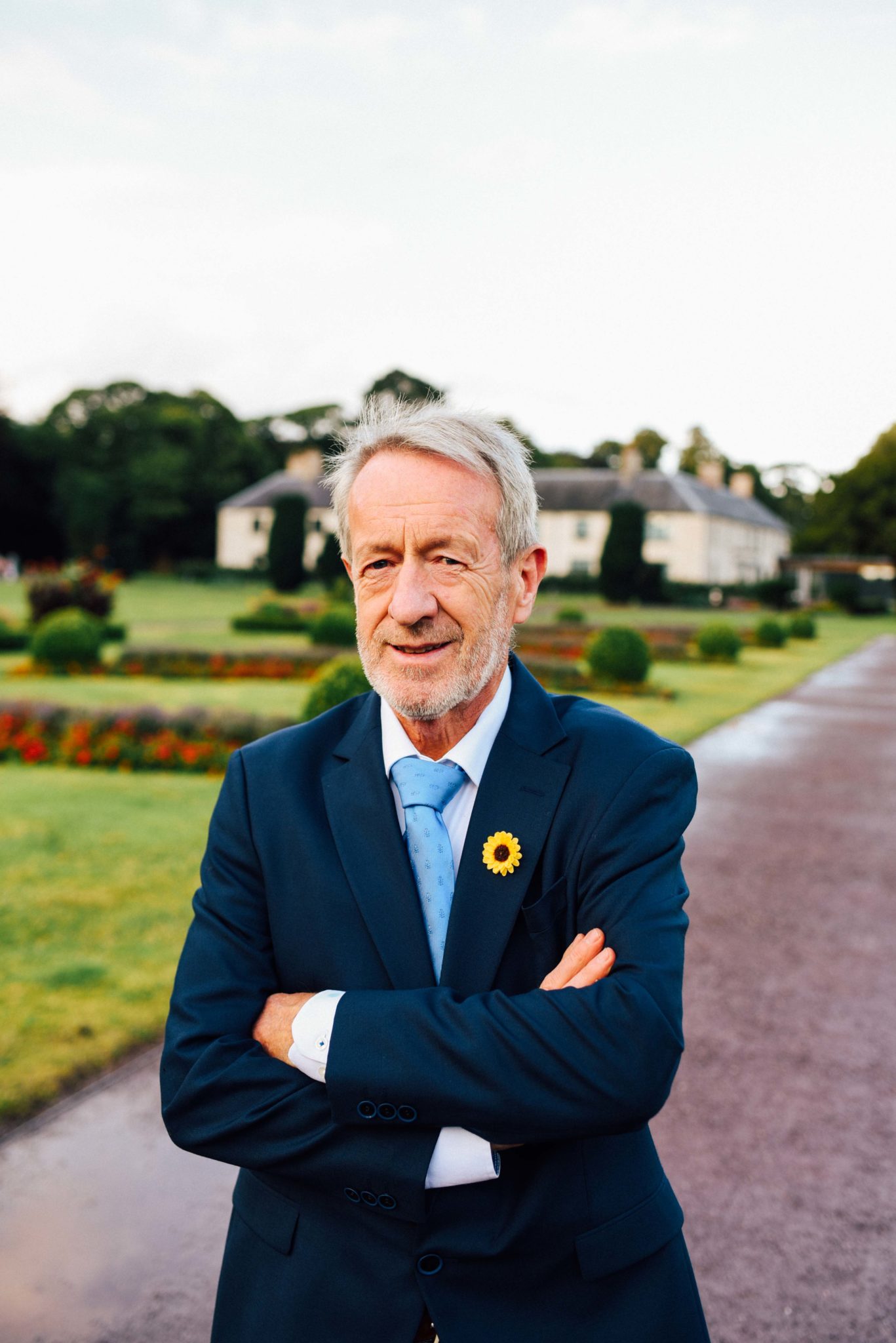
Sean Kelly. Copyright Miguel Ruiz.
Jason O’Toole: You once told me that your home county Kerry was still haunted by missing out on the elusive five-in-a-row, losing to Offaly in the All-Ireland final in 1982.
I think we’ve got over it at this stage. It did affect us for a long time because the chance of history was snatched at the last minute. But like everything, you see it in perspective. And, of course, when it has happened to other counties since – Kilkenny [hurling team]. But to our great, I wouldn’t say disappointment, but surprise, Dublin have done it – not just five, but six in a row!
There’s a famous photo of you consoling Mick O’Dwyer after the game.
It really had a devastating effect on him. I was so sorry for him because everything was built around that. And to be so close to it! But that’s sport. I used to always look at the other side: it was great for Offaly, it was great for the GAA. And for a player like Matt Connor to win a medal, I think, was important as well.
Would you consider Dublin the greatest team of all time?
They have to be when you win six in a row. No other team won more than four in a row. And the last time they won they were up against it in the final moments but they dug it out. So that consistency has to make them the greatest team of all. They broke all the records. And they broke all the records because they were the best team, full stop.
You played in Croke Park yourself.
I played once or twice there, not very well, but at the same time I enjoyed it. I think for anybody just to get on the pitch in Croke Park, and play, is a kind of a lifetime achievement. How you played is only secondary to that.
You and your brothers all played on the same side with Kilcummin GAA.
In 1973, we won our one and only ever East Kerry senior football championship. And myself and my three brothers were playing and my other two brothers were subs. And one of them would have been captain, except earlier that year he broke his leg. But he was just coming back so he made the bench. That year, we won everything. County junior championship, East Kerry senior championship, league, you name it. We thought those days would last forever. Well, we celebrated the 50th anniversary of it last year and we still haven’t won it since!
Your late brother, who was a priest, was on that team.
Yeah, Padraig. He passed away in 1988. And he was a very good football player. He got an injury with a chainsaw and, unfortunately, got a cut out of it and died suddenly. So, it was sad.
His death motivated you to get into politics.
That’s true. Life is short and also life is what you make of it. So when opportunities come, you have to try and grasp them. I think of the phrase, “It’s a lifetime opportunity and take it while the opportunity is there in your lifetime.”
One of your lasting legacies will undoubtedly be abolishing Rule 42, which had prevented so-called foreign games being played at Croke Park.
I often reflect on it and I wonder, how did we get it over the line? Because I’ve seen things going to the Congress since and they have the backing of the central council, they have the backing of the management committee, that they put forward by a sub-committee appointed by the president, and they still get beaten. And yet (abolishing) Rule 42, which had the backing of nobody really in the hierarchy, got the majority necessary. So, it was a special achievement, a very important one for Ireland. And it moved us forward as an organisation.
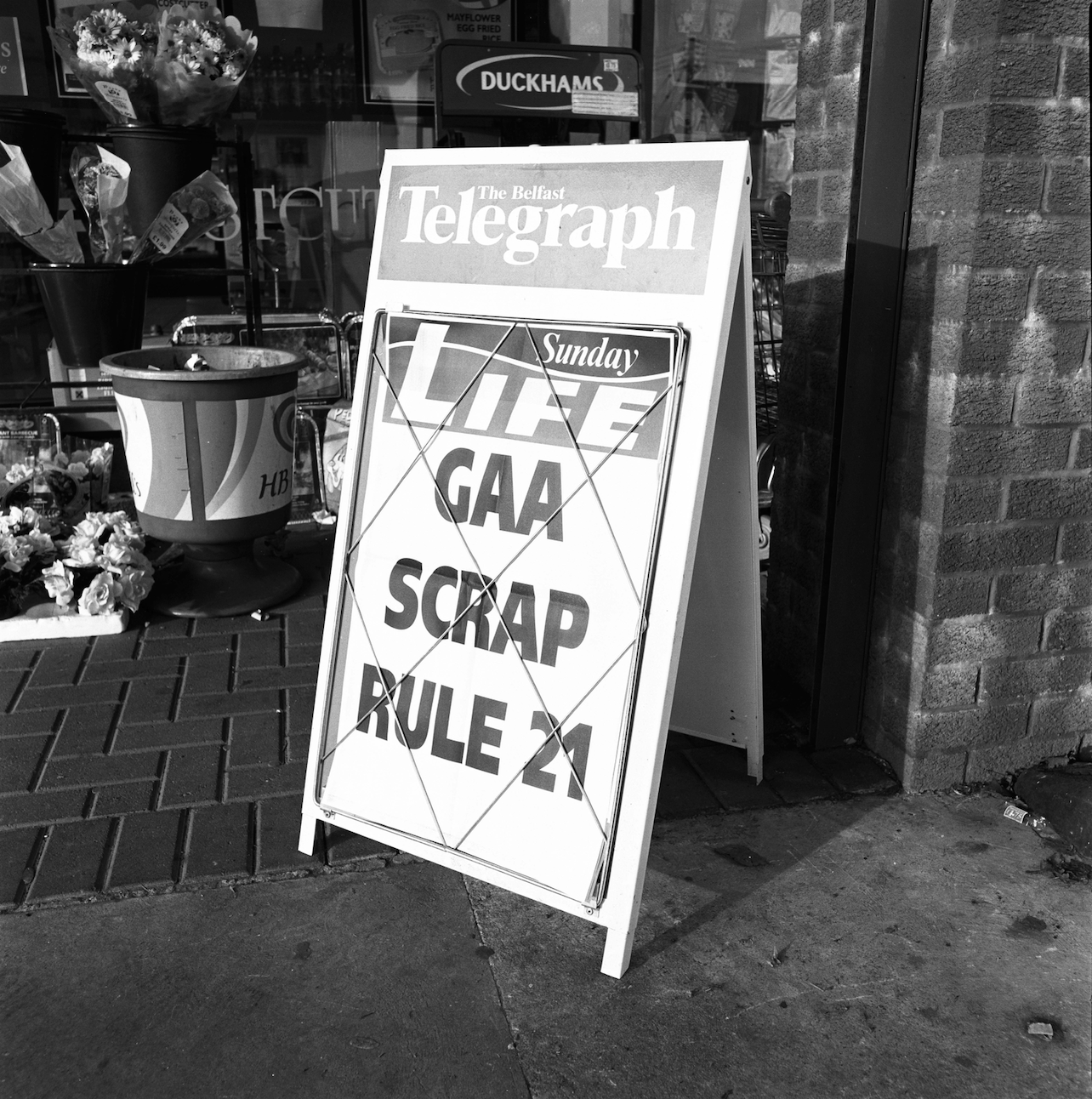
Did you receive any death threats over it?
I got a few alright – because it was a hugely emotional thing. I’m glad that social media wasn’t there like it is today because it would have absolutely been horrendous. But it wasn’t there, so most people had to either go to the trouble of picking up the phone or writing a letter, which inhibited a lot of people who might otherwise have done so. But it was a difficult enough time.
Did you report them?
No, no. I didn’t want to be bringing any attention to it. A lot of it I kept to myself, because it would be very upsetting for the family if they knew that was happening. So most times I just put it aside and got on with it.
If Rule 42 had been changed earlier what else might it have achieved?
There wouldn’t have been any need for the Aviva Stadium. We could have just had Croke Park. You know, Dublin is a small enough city. We could have had the one stadium for the rugby, soccer and Gaelic. That’s one of my regrets. I mean, we are short of lots of things in Ireland, but the one thing that we have too much of is probably stadiums everywhere. And they cost a lot of money. They’re not full very often.
So you wouldn’t have supported the Bertie Bowl?
Actually, the opening of Croke Park probably got rid of a third stadium in Abbotstown, which Bertie Ahern wanted to build – so wouldn’t we look nice with three stadia in the city when one would have done. So at least that was one positive thing. We have probably far too many in Ireland and costing a lot and it isn’t easy to keep them either full for matches or events. And also, of course, the ongoing remedial works, management is very, very costly.
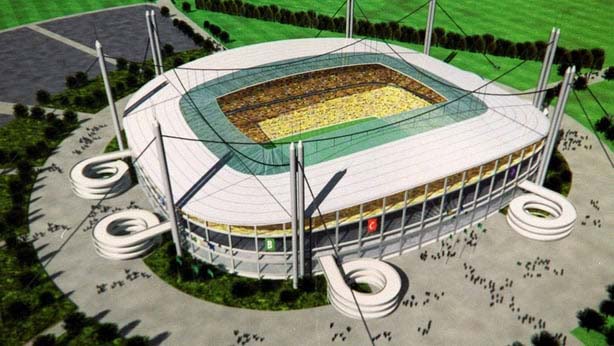
Bertie Bowl
You probably don’t get enough credit for your role in helping to scrap Rule 21, banning British soldiers and members of the RUC from playing Gaelic games.
I’ve been trying to give really the credit to my predecessor, Seán McCague. I worked closely with him and we discussed how it should be done. I remember saying to him, “Seán, you need to get that done while you’re president because you’re coming from Northern Ireland. Ulster will probably row in behind you. It mightn’t be that easy for somebody not from Ulster to do it.” And, in fairness, that’s the way it panned out. I think the major credit will go to Seán McCague. Certainly, we worked closely together because I was president-elect when it was done. But he was the main man.
Isn’t it disgraceful that tickets for big GAA games have shot up to €100?
In fairness, they haven’t gone up for six or seven years. And some county boards are already charging a hundred because they used to charge an extra ten for the development of squads in their counties, and so forth. So a hundred is a lot – but, at the same time, it’s something that people are willing to pay for the occasion. There doesn’t seem to be any fall-off in terms of applications for tickets, etc. But it is a lot of money. It’s something that you wouldn’t want to be doing too often. They’ll probably get away with it, when you consider inflation and the cost of running the games. People will probably look at it that way, more than just the actual fact that it’s gone from €90 to €100.
Do you think it’s right that the GAA make so much money out of the efforts of the players?
It’s an amateur sport and the players, in fairness, most of them, want it to remain that way. It was a bigger issue when I was president, when players weren’t getting taken care of properly in relation to travel expenses, meals after training, gear, recovery, strength and conditioning, etc. So all that now has changed. Indeed, I think a lot of counties are stretched to make ends meet because of the costs of training inter-county teams. From that point of view, once the money is being sent back down the line most players are happy enough.
Should the players not be rewarded financially?
It’s a slippery slope. If it starts, where does it finish? In fairness, they haven’t looked for it. I think they’re committed to both club and county and taking care of them properly and giving them opportunities to do promotions and to benefit from their names and their profile is probably the best way. After all, we’re a small island. We have only four or five million. So if you went down the professional route, would you be able to maintain it for long? I’m not sure. Some counties are extremely small. One of the big challenges is, are they going to be able to afford to compete and be competitive into the future? Or will it narrow into just those bigger counties with the resources or maybe the historical support?
Was it a big mistake to bring the All-Ireland finals back to July?
When it came before Congress, two years ago, I was amazed that there wasn’t one single voice raised against it. And that was because, I think, the players were in favour of it. But I think it’s about time to reassess it. The whole season is extremely condensed. There are a whole pile of games going on, which are very hard to focus on. So the opportunity to promote the game is being lost. And even some fantastic games, which would otherwise dominate the headlines, are nearly over before a lot people know they’re on. I think we’ll probably see a change, maybe to move it back to August. And also, of course, the fact that you have to finish some major games on the day, leading to penalties, that goes against the grain of it too.
What about the extent of sledging and abuse in the sport?
I feel there was more going on a few years ago, which is terrible. There’s a pent-up emotion, there’s often fierce rivalry, but you have to know where to draw the line. In fairness, most people do. It’s a horrible way to behave. I think they clamped down on it, and there’s also an appeal to people to behave a little more gentlemanly, let’s put it that way. It shouldn’t be tolerated because it’s bordering on abuse, essentially, of players and often making allegations that aren’t true or referring to a player’s family or something. I think no genuine sportsperson would resort to that – or they shouldn’t be allowed to get away with it if they do.
Wouldn’t it make sense to have a united Ireland soccer team, like with rugby?
It certainly would. It would be great. I’m disappointed it hasn’t happened and there isn’t much progress towards it. There’s talk about it every now and then. But definitely, if you look at the Euros this year and look at where the Irish soccer team is, and where the Northern soccer team is, you’d say to yourself: “Isn’t it a pity we can’t have a united team, the same as we have in rugby?” Our rugby team have shown the benefits, both politically and sporting-wise, with our united Ireland team. It would be great if we could have the same in relation to soccer.
Do you have any ideas on how to get the ball rolling?
I’d made inquiries about setting up an all-Ireland domestic soccer league, which might be the forerunner to that. I think that certainly should be explored. Again, as a very small country, we should have an all-Ireland approach to everything that we can and sport should lead the way. It would be great if we could get an all-Ireland domestic soccer league as well.
You’re related to former Taoiseach Enda Kenny’s wife Fionnuala – who worked for the then leader of the Fianna Fáil party, Charlie Haughey.
She was a very important part of his cabinet, as we’d say here in Europe. But when she converted, she converted 100%. It just shows that you must know when to draw the line when it comes to rivalries, be it in sports or politics.
Was that one of the reasons why you joined Fine Gael?
Not really. I would have been committed to Fine Gael, without being involved, because of Garret Fitzgerald. I liked him. I appreciated what he was doing, and the way he conducted himself and [his political ideology] the Just Society and all that, I felt all of it was positive. I became a distant follower of Fine Gael before I became a member.
You only got involved in politics in 2009.
I was asked to go for the Dáil by different parties, including Fianna Fáil, the Progressive Democrats and then Fine Gael. I remember one thing Mary Harney (of the Progressive Democrats) said to me when she asked me and I said I wouldn’t – she said: “Seán, I don’t mind you not going for an election for us, but I think you should go into politics because you’ll be good at it.” And that stuck in my head. So then I kind of began to think about it. Fine Gael asked me to run in the [general] election in 2007 but I didn’t go, and I thought that was the end of it. And then they came back to ask me to run for Europe and I gave it a go. And I’m delighted I did.
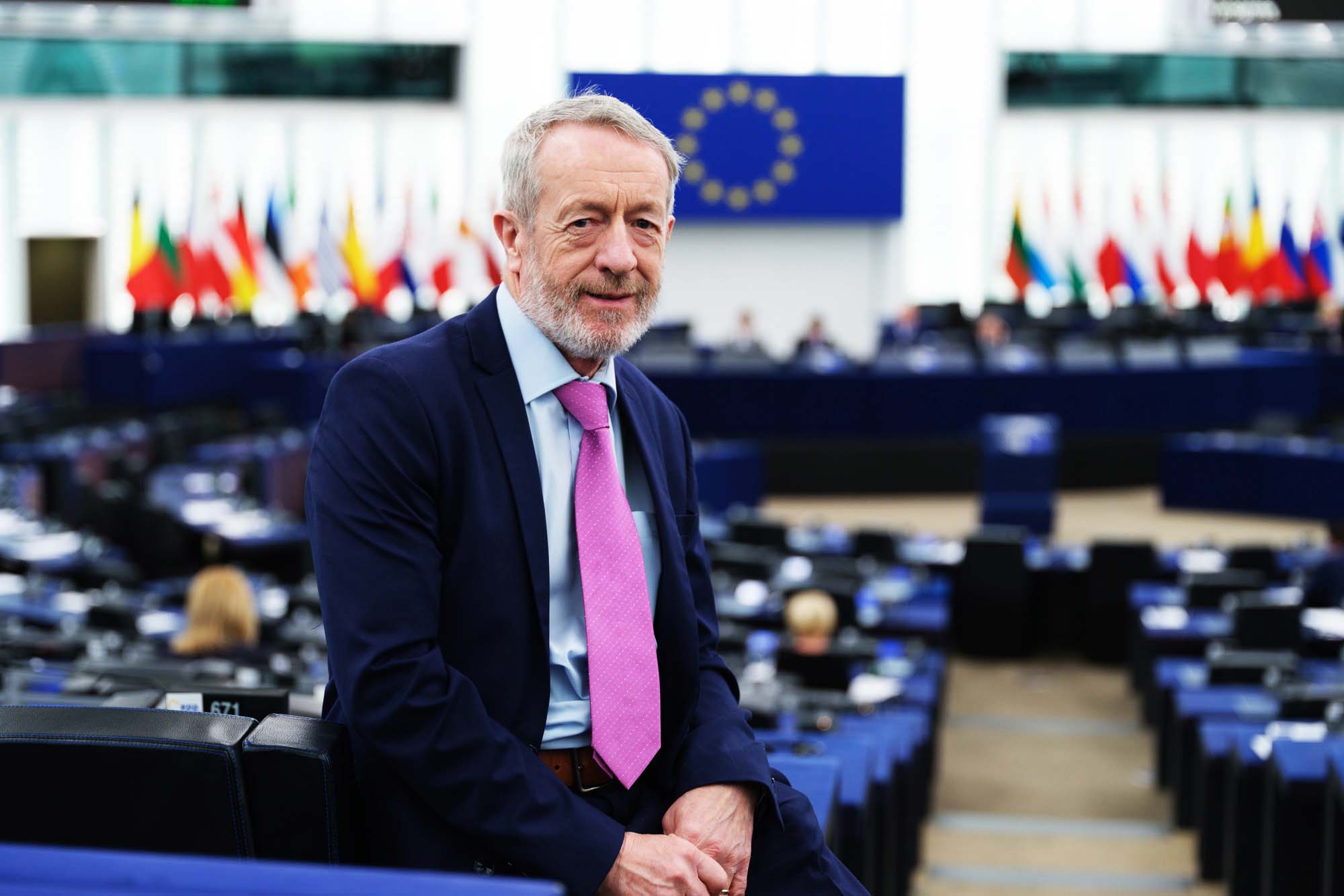
You were encouraged to run for the Dáil recently.
Yes, before the (recent) European elections. Fine Gael came to me because they thought I’d have a good chance. But I said no. I’ve been here [in Europe] now 15 years. I said if I was to continue here, I could do a lot more than changing tack, maybe letting my staff go. I have an office in Clonmel, shutting that down, starting afresh in Ireland, and learning basically a whole new ballgame in terms of how the Dáil functions. You’d be starting from scratch. And I said, at this age, I didn’t think it made sense for me. Even though they did say I’d probably get a Ministry position if I went forward. But no, I’m happy I’m here.
Would you consider running for the presidency?
Well, it’s something that’s been mentioned to me on several occasions. It wasn’t really ever, let’s say, an ambition of mine, but at the same time, it’s something that has been mentioned. And I’ll probably give it a thought. Obviously, the votes I got in the European elections put me in the mix with people when they are thinking about candidates. So I wouldn’t be overly ambitious. Apart from the honour, you’d have to look at it from the practical point of view as well. So let’s see. But at the moment, I’m committed to Europe.
Have many prominent people in the party approached you about it?
Some definitely have. Quite a few, actually. And then people in the constituencies will say it to you. But I want to keep it low-key for the moment. I don’t want to be building it either one way or the other.
What what would your style of presidency be?
It’d be a bit like my style when I was president of the GAA. I’d be very inclusive. I’d be conscious of the less well-off in Ireland and ensuring they got a better quality of life. And I would be going about my own business and I wouldn’t be always looking for the biggest group to go to or the biggest invitation. Maybe the smaller ones would be important as well, to show that they were equally important. I remember a few times when I was president of the GAA, I would be invited to open a pitch of a Division 3 or 4 club and then maybe a month later, another invitation would come to open a major country grounds [on the same day]. And I’d say, “Sorry, I’m not doing it, because I’m committed to the club.” And I would think that kind of a style would be, if I were to go for President and get it, the approach I would have as well.
Robert Redford’s character in The Candidate said, “I thought a beard is taboo in politics.” Would you consider shaving off yours if Fine Gael asked you to be their presidential candidate?
Yeah, it’s nearly gone at the moment, but maybe it’s time to think about that again.
What’s your thoughts on US President Joe Biden and how the debate fiasco led to him falling on his own sword?
I’m kind of sorry for him. I was surprised that he took a debate so far out from the election. Maybe he had no choice, I’m not sure. But there is one theory about debates, which I think is true: they are there for the incumbent to lose. And Joe Biden certainly lost. He probably overprepared with statistics and everything else. When you’re up against a fellow like Trump, who doesn’t deal with facts and figures, I think you really have to be alert and take the debate as it’s coming, rather than trying to fill your head with all sorts of statistics and trying to remember this and remember that. I think that’s the mistake that an awful lot of advisors make in preparing any politician for debates of that nature. You can’t control the debate. You don’t know what’s going to come and if you’re trying to think of a reply that was given to you or a whole pile of statistics, then you might falter. And I think that’s probably what happened.
You’re pushing the idea of Ireland switching our clocks to align with mainland Europe.
I don’t see why it has to go back at the end of October or wait until the end of March to bring it forward. If we could reduce even wintertime to three or four months. That’s one of the things I’m going to be putting on the agenda, if I can, here in the European Parliament.
What’s the problem with the way it is?
I think it brings in winter overnight. Once it comes in at the end of October, you have long nights, depression for a lot of people, the elderly, an increase in energy costs, the heating has to go on earlier, etc. They’re inside their houses all day, not having the opportunity to go for walks in the evening. And then you’re waiting for a full month almost from spring to come in, in the summertime. The vast majority of people, when they were asked, I think it was over 83 or 85 percent, said they’d like to see the bi-annual clock change ending.
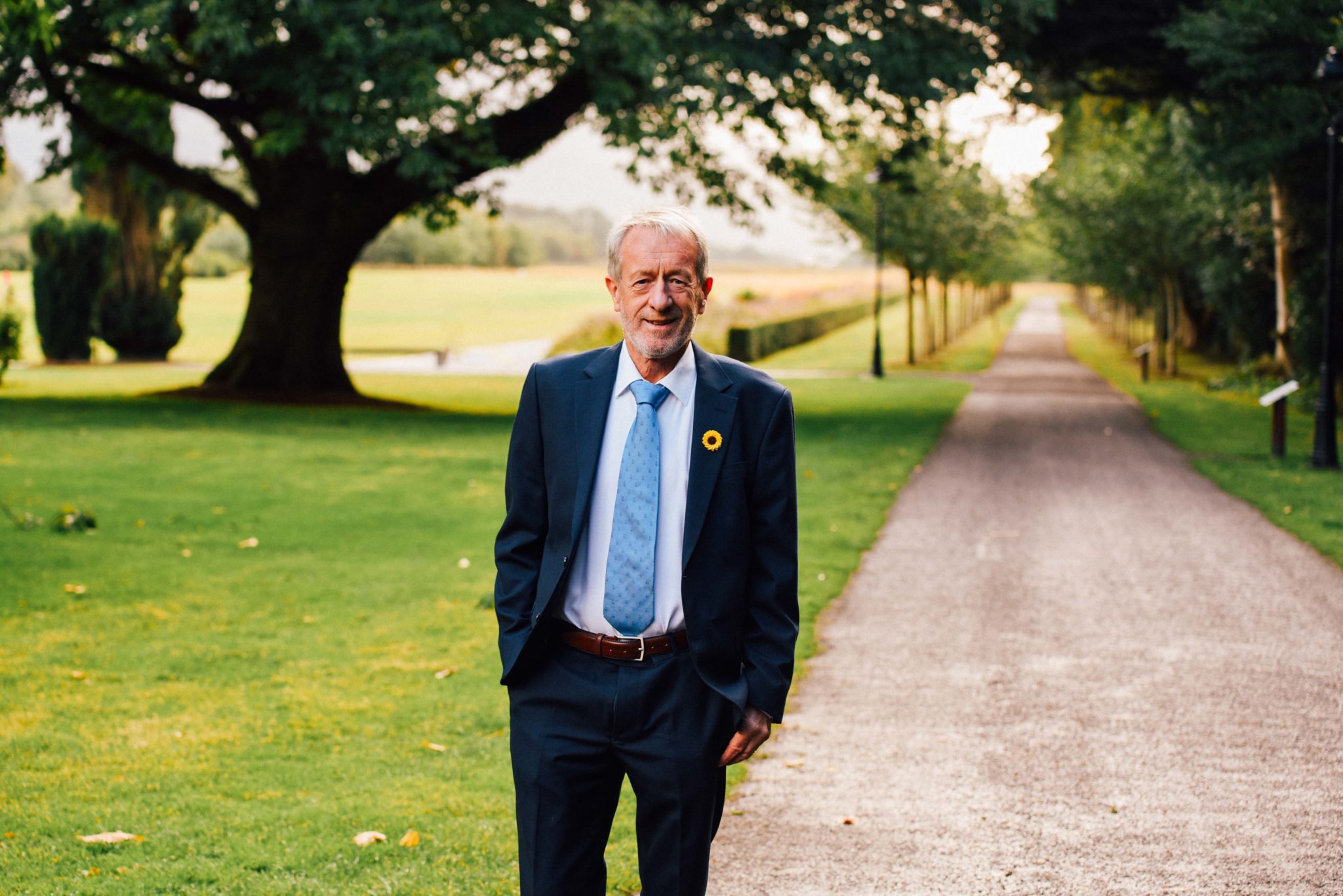
Sean Kelly. Copyright Miguel Ruiz.
Would you describe yourself as a religious person?
I come from a very religious family. So, I would be committed to religion, but I wouldn’t be a fanatic. And I would have an open mind on a lot of things. God said tolerance: I think our Lord said, love God and love your neighbour. A lot of religion is overdone. So, I think tolerance and forgiveness are huge aspects of religion.
Did your brother’s tragic death affect you in a big way?
I would say so. He’s buried in County Laois and every single week when I go to Dublin Airport and I’m coming back, if it’s in daylight hours, I come off the motorway and call in to say hello to him. So, I still feel his presence. It actually amazes me that, especially down in Skibbereen and in Waterford, people still come up to me and remember him. I think he was the first PE teacher in De La Salle College, Waterford, and, of course, he was dressed in a tracksuit, not in the religious garb. So, they called him Paddy Tracksuit. So, they still remember him fondly. He was only 39.
Did you think about joining the priesthood yourself?
I was encouraged to, but I decided not to. In actual fact, I remember when we were doing the Leaving Cert, somebody came in and said the bishop wanted to meet us. Anybody interested in going for the priesthood? And I was one of those who left. And it was Bishop Casey, the renowned Bishop Casey. And I said, do I really want to? And I stopped and I went back up to the classroom. So, it was a decisive moment. I didn’t go forward. And I’m glad I didn’t because it wasn’t really what I wanted.
Would you believe in heaven and hell?
Yeah, I think there is some afterlife. It’s not easy to define it. But what convinced me about something like that was I was in NASA on an inter-delegation trip about four years ago. And we met the top people at NASA. And they did research into all sorts of things. And I asked them that question. And the answer they replied was, we can prove how things evolved, but we can’t prove how this happened. So I think, in other words, there’s some kind of infinity there. No matter what research we do, you can’t actually say what’s happened. That’s what he said to me. So, in that sense, there is a life outside of life in this world.
So what do you hope heaven will be like for Seán Kelly?
Well, they tell us it’s a state of perfect happiness. So we must believe that. But let’s see what happens.
What’s hell like for terrorists and murderers and people like that?
Actually, I’m not sure. Is there any hell there? Our Lord said there was good in everybody. There are circumstances which mightn’t make sense to us, but they might make sense to other people.
I interviewed Danny Healy-Rae, who’s a fellow Kerryman, for Hot Press. He told me that Noah’s Ark was proof that God was in charge of the weather.
I remember it well. Danny comes out with interesting statements. So maybe Noah’s Ark originated in Kilgarvan. Maybe Danny was there in a previous life!
What are your thoughts on euthanasia?
It’s a very tricky subject. It’s something that’s extremely difficult to legislate for, number one, because then it could be abused. But I suppose there are times when – it happens to everybody, where somebody is on a life support machine and the doctors say there’s no hope when they turn off the button or the switch. Is that euthanasia? I’m not sure. But it’s something that you’d have to be very cautious about, because if you introduce it then where do you draw the line? I think that’s the difficulty.
Did you ever smoke marijuana?
No, thankfully. The worst I ever smoked was cigarettes. And I smoked quite a bit of them. And I never really probably properly inhaled them. And as a sports person, once I was committed to sport, we were told cigarettes weren’t good for you. I think being committed to sport, I decided that I wouldn’t smoke. And secondly, probably we couldn’t afford it, going to college.
What would your thoughts be on legalising marijuana?
Medically, there may be a case for it. I think I’d have to leave it to the experts, but you’d have to be very careful. But, at the same time, there’s a huge black market there, drug cartels, etc. And maybe there might be a case for it. I know that there’s been planning, I’m going to make a strong case for some of it, that it could be done – if there was a logical case, that would reduce the obvious atrocities that occur, associated with drug addiction, both in terms of the drug cartels and the horrible killings, and tit for tat killings, and innocent people being taken out because they owed a small debt, and lives being destroyed. If there was a medical case, I think we should look at it. I’m not saying I’d be in favour of it, but I’d like to hear it.
What about the Portuguese model, where people don’t go to prison for having a small amount of cannabis or cocaine? It’s more health-related there.
I think that makes sense. Because the whole aspect should be about helping people to come out of it, rather than penalising them for being on it. And I think we’ve probably far too many people in prison who aren’t really a threat to society, and that’s something that certainly should be looked at.
Isn’t it the failure to control social media not a major cause of the rise of the far right in recent years?
And also a vehicle for them to rise further and to spread their hate. And I really do think that, at European level, we’re going to have to look far more closely at, let’s say, legislating and regulating what is allowed in social media. And in particular, the constant hateful insulting and abuse of those you don’t agree with.
It seems to affect politicians more than most…
Politicians get the brunt of it. And we’ve seen, I’ve no doubt about it, a lot of public representatives not going to go forward in the next election – and a number of them mentioned the toxicity of social media as one of the reasons. And I think if we don’t make efforts to regulate it properly, it’s going to get worse. So certainly that’s a challenge for us in the next mandate here.
So, you’d support treating social media platforms as publishers? Because that’s effectively what they are.
I think so. We have to be far more alert in scrutinising what’s being done, how they’re accountable, what they take down, and how quickly they take it down, to basically protect also the good name of people who are either public servants or whatever, that false charges aren’t made against them without any substantiation. And they’re being accused of this, that and the other thing. And I think it’s gone too far altogether. It has affected quite a few politicians, business people, or people in the public eye, and sports people, also. I think it’s gone too far.
You mentioned NASA there. So, I have to ask you: what’s your thoughts on aliens?
I’m not sure. I’d want to see them myself, probably before I’d really believe in them, or to prove that there is life on another planet. I think that’s a long way off.
RELATED

- Opinion
- 24 Dec 25
Migration: It's Time To Stop Blaming The Victims

- Opinion
- 17 Dec 25
The Year in Culture: That's Entertainment (And Politics)
RELATED

- Opinion
- 16 Dec 25
The Irish language's rising profile: More than the cúpla focal?

- Opinion
- 13 Dec 25
Trump’s assault on Europe: "Happy new year? Somehow I don’t think so..."

- Sex & Drugs
- 11 Dec 25





